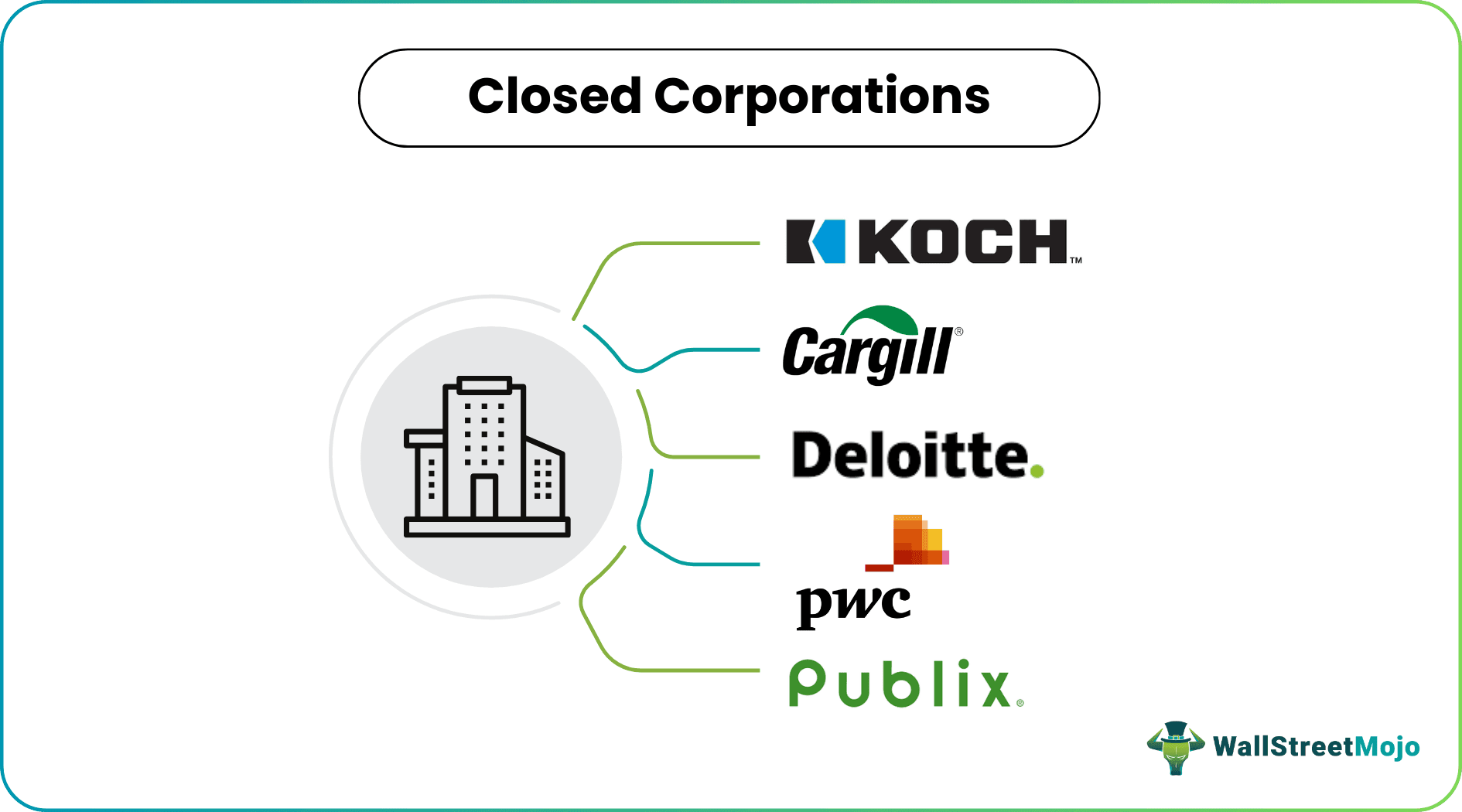Table Of Contents
Closed Corporation Definition
A closed corporation is a company which does not raise funds from the public and instead operates with a small number shareholders to ensure supreme control over its functioning. Unlike a publicly-traded company, closely held corporations do not have to observe strict corporate regulatory norms regarding business operations and data reporting. There are special rules that are set to govern such corporations.

Key Takeaways
- Closed corporations are companies that operate with a small number of shareholders.
- The general public does not get involved in the corporation as the shares are not traded in the stock market.
- Such closely held corporations do not have to observe strict regulations regarding the operations and reporting of data as happens with public corporations. They work in accordance with the laws of a particular state.
Characteristics of Closed Corporation

A closed corporation is formed as per the provisions and acts of the state government. The governing rules vary as per the government. Upon meeting the requirements, a company needs to officially get the 'close corporation' status to enjoy the prerogatives that flow from its nature. Let us discuss the characteristics in detail below.
- For starters, the shares are not traded in the stock market, and hence the general public is not involved in the company's management. For instance, US grocery giant Albertsons was a popular name as a close corporation with the backing of private equity firm Cerberus. In 2020, Albertsons became a publicly-traded company with an $800 million IPO.
- The company shares are procured by a small group of people with the maximum number not going beyond 36. In many cases, the shareholders assume management duties and ensure proper operational efficiency. Since the duties of owners and managers usually overlap, the shareholders' agreement includes integral details to help with managerial and financial decisions.
- In a way, the management functions could resemble those of a partnership entity. A study listed several possible reasons behind drawing the analogy between the two. One important reason being, many owners perform management duties. It enhances the risk factor for the shareholders upon a failure concerning the performance of the corporation. Since there is a small network of owners, it is a closed-knit group and is known by many names such as a closed-knit corporation, private company, close corporation and privately held company.
- Apart from filing corporation required documents, the corporate regulatory provisions are flexible for them especially in relation to reporting performance-related data using annual reports and meetings.
- Although, several factors vary as per organizations. For example, many popular private companies such as Cargill prepare annual reports to talk about performance and revenues. Another important point is that these companies need to act according to the acts and provisions of the state government revolving around a close corporation.
- Few individuals are involved in management. The maximum number of directors is usually five, which makes the running of the business smooth. Many of them are shareholders.
Closed Corporations Examples
Many privately held companies in the USA are involved in retail, manufacturing, financial services, and other business services. Below is a brief guide on some renowned closely held corporations.
#1 - Koch Industries
- Koch Industries is amongst America's largest private companies. The company was founded in 1940, and its industries are involved in different business lines such as manufacturing, refining, chemicals, consumer products, fertilizers etc. It has more than 120,000 employees working in over 50 countries.
In a list compiled by Forbes last year, Koch Industries took the spot from Cargill to become the number one private company in America. Cargill had ruled the number one spot for 12 years. Koch Industries' had amassed the revenue of around $115 billion for the year 2019.
#2 - Cargill
- Cargill was founded in 1865. It has around 155,000 existing employees. The company was formed at the end of the American Civil War. It initially operated as a grain storage provider. Today, it has grown into a renowned international brand for agricultural products such as food, sugar, refined oil. Among other things, it also provides risk management facilities. In 2020, its revenues were $114.6 billion, a little short of Koch Industries'.
Other popular close corporation names include H-E-B, Deloitte, PricewaterhouseCoopers (PwC) and Publix Super Markets.
Advantages
#1 - Fewer Formalities
Owners have more time for business than setting aside time for complying with strict corporate regulations. There are a few documents to be filled in, like incorporation documents. With hardly any obligation to conduct the annual meetings and prepare performance reports, the cost normally spent on their arrangement can be saved. Moreover, management can focus better on vital roles.
#2 - Better Management
They enjoy flexibility in operations as there is not much interference from a sea of shareholders as happens in a regular corporation. It is easier to make decisions since it only involves a few members.
One of the shareholding rights is to directly express opinions, which is handled better in private companies. For example, the opinion of each shareholder can be taken into account regarding any capital restructuring decisions. They may clearly express how much amount of debt they are comfortable with.
#3 - Reducing Shareholders' Liability
When there is much less pressure to follow corporate formalities, it reduces the liability on shareholders should there be a discrepancy in following corporate norms. Moreover, in some private companies, shareholders are not burdened with debt liabilities. In short, individual company norms play a very crucial role in deciding members' roles and their liability. Such freedom is not available in a regular corporation.
Disadvantages
#1 - Limits Qualifying Corporations
There are not many states in the USA that allow the formation of private companies. Some of the states in the United States that recognize statutory close corporation are Alabama, Arizona and Texas, among others. Private companies that do not fall in the above states will not be able to get authorization.
#2 - Limited Shares Trading
Selling shares becomes an uphill task as, in many cases, they need to be sold amongst the existing shareholders. A seller struggles to find takers leading to a compromise on the amount received after the sale.
#3 - Not for the General Public
Not raising money by publicly selling the shares pose a separate set of challenges. During a business crisis, the corporation is left to look for other financial options.
#4 - Increased Responsibility
With the duties of owners and managers overlapping, shareholders' responsibilities are more in private companies. Besides, minority shareholders have a lesser say than majority shareholders.
